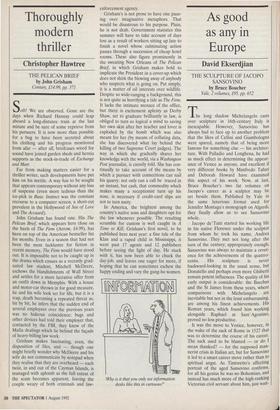Thoroughly modern thriller
Christopher Hawtree
THE PELICAN BRIEF by John Grisham Century, £14.99, pp. 371 Soft! We are observed. Gone are the days when Richard Hannay could leap aboard a long-distance train at the last minute and be sure of some reprieve from his pursuers. It is now more than possible for a bug to have been secreted about his clothing and his progress monitored from afar — after all, briefcases wired for sound have joined garden sheds and hernia supports as the stock-in-trade of Exchange and Mart.
Far from making matters easier for a thriller writer, such developments have put him on his mettle. A way has to be sought that appears contemporary without any loss of suspense (even more tedious than the ice-pick in Basic Instinct was the constant recourse to a computer screen, a short-cut prevalent in the Hollywood of Sea of Love and The Accused).
John Grisham has found one. His The Pelican Brief, which appears here close on the heels of The Firm (Arrow, £4.99), has been on top of the American bestseller list for months. Even in a season that had not been the most lacklustre for fiction in recent memory, The Firm would have stood out. It is impossible not to be caught up in the drama which ensues as a recently grad- uated law student, Mitchell McDeere, eschews the blandishments of Wall Street and settles for a more lucrative offer from an outfit down in Memphis. With a house and motor-car thrown in for good measure, he and his wife look set for life, but it is a trap, death becoming a repeated threat as, bit by bit, he infers that the sudden end of several employees over the previous years was no hideous coincidence: bugs and other devices had told their employer that, contacted by the FBI, they knew of the Mafia dealings which lie behind the façade of heavy-billing law work.
Grisham makes fascinating, even, the disposition of files, and — though one might briefly wonder why McDeere and his wife do not communicate by notepad when they realise that they are overheard — each twist, in and out of the Cayman Islands, is managed with aplomb as the full extent of the scam becomes apparent, leaving the couple weary of both criminals and law- enforcement agency.
Grisham's is not prose to have one paus- ing over imaginative metaphors. That would be disastrous to his purpose. Plain, he is not drab. Government statistics this summer will have to take account of days lost as a result of workers sitting up late to finish a novel whose culminating action passes through a succession of cheap hotel rooms. These also figure prominently in the sweating New Orleans of The Pelican Brief, in which Grisham makes bold to implicate the President in a cover-up which does not shirk the blowing away of anybody who suspects what is going on. Put simply, it is a matter of oil interests over wildlife. Despite so wide-ranging a background, this is not quite as horrifying a tale as The Firm. It lacks the intimate menace of the office, but there is excitement aplenty as Derby Shaw, set to graduate brilliantly in law, is obliged to turn so logical a mind to saving her own skin after her teacher and lover is exploded by the bomb which was also meant for her (by means of collating data, she has discovered what lay behind the killing of two Supreme Court judges). The way in which she gradually shares her knowledge with the world, via a Washington Post journalist, is cannily told. She has con- tinually to take account of the means by which a pursuer with connections can nail his quarry: not only can a call be traced in an instant, but cash, that commodity which makes many a receptionist turn up his nose, is necessary if credit-card slips are not to turn nasty.
In America, the brightest among the country's native sons and daughters opt for the law whenever possible. The resulting scramble for custom is well caught in A Time to Kill, Grisham's first novel, to be published here next year: a fine tale of the Klan and a raped child in Mississippi, it went past 17 agents and 12 publishers before seeing the light of day. He stuck with it, has now been able to chuck the day-job, and leaves one eager for more, if hoping that he can sometimes eschew the happy ending and vary the gung-ho women.
IMORMIIION
`Why is it that you only see information desks like this in cartoons?'


















































 Previous page
Previous page